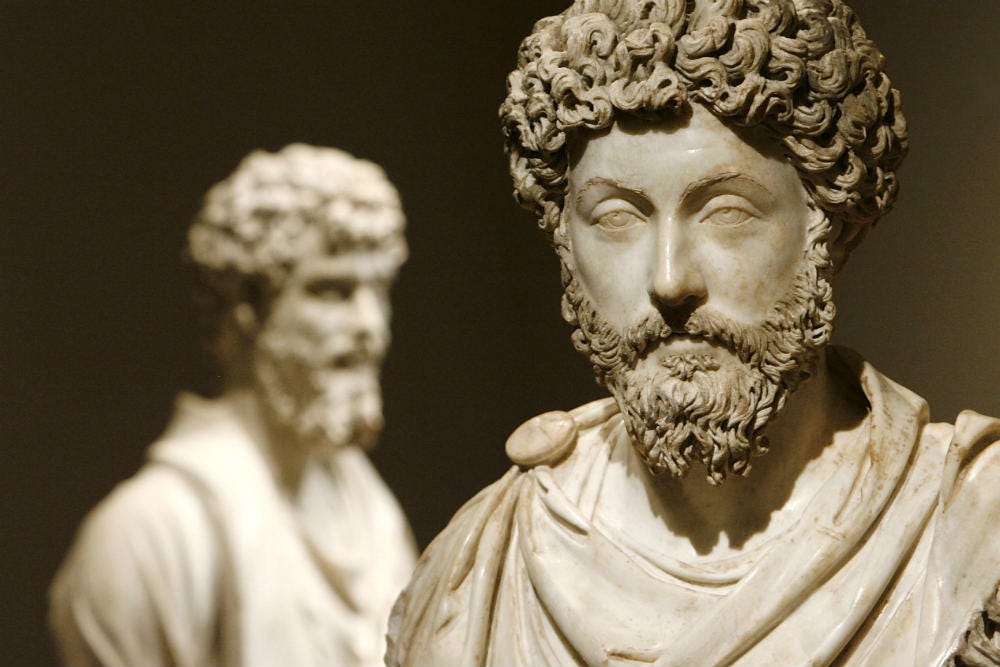“Let not your mind run on what you lack as much as on what you have already.”
Marcus Aurelius
We have a tendency to take everything that we already have for granted. Perhaps you spend months craving the latest iPhone. You save your money and when the day comes, you trade it in for that shiny, shiny model. However, come next year, you have the same feelings. Now, the iPhone that, at one point in time you felt would make you happy ‘till the end of your days simply blends in with the rest of your “bland” life.
Are We Materialistic Because of Capitalism?
Some blame this desire to always acquire something new, this “materialistic” drive, on capitalism. We could perhaps argue that capitalism doesn’t help this tendency, but it would be ineffectual to claim that capitalism embeds materialism into our psyche. It’s deeply ingrained into our drives, which is why the Stoics spend much time tempering desires.
It may surprise you to hear this, but I believe that that drive is a good thing. It can (and does) manifest itself ugly in our modern, privileged world, but the underlying drive to put oneself in a better position in life is the backbone of our survival.
If at no point in human evolution had our ancestors considered “huh. Maybe I could make this shelter better”, then perhaps we would still be living in caves!
Hence, it’s difficult to claim the drive to improve status as inherently bad; we wouldn’t be the species we are today without that psychological drive. However, it can venture into philosophically unhealthy territory.
But when? When is improving upon something or acquiring a better tool healthy and when is it not?
Maslow’s Hierarchy of Needs
First, let’s cover the basics. Below is Maslow’s hierarchy of needs. It’s a simple illustration of a human’s journey from a state of suffering to transcendence. There’s a lot to unpack here, but note the bottom two layers - physiological and safety. What this means is that, before love, self-esteem, education, aesthetics, self-actualization, and transcendence come our basic human needs.
Stoicism and Needs
Food. Water. Shelter. Without these base necessities, people generally find themselves in frantic states. Many think that the Stoic perspective is that we do not need food or water to flourish since they are externals. That is rubbish as far as I’m concerned.
How could one possibly look at a starving child who hasn’t eaten or drank anything for days and think “If only they changed their opinion!”
It’s nonsensical.
The simplest way I’ve come to think about it is this: human psychology functions properly given minimal physiological security. Some have pushed the boundaries - Viktor Frankl, for example. However, readers of Man’s Search for Meaning should know that Frankl was analyzing himself objectively and fully acknowledged his lack of proper psychological functioning with the exposure and malnutrition he had to deal with.
The point is that, yes, human beings need some base necessities to ensure a properly functioning psychology, allowing us to self-actualize and ultimately transcend life’s suffering. Hence, if you do not have these things, then perhaps it’s a good idea to seek them out.
We should also pursue transcendence through self-actualization. That is really the “self-improvement journey”, whose scope is outside of this discussion, but it should be made clear that aiming toward a better future is not an Evil.
Modern Humans
With the above caveat explained, I could also venture a guess that most of the people reading this article already have those basic needs met. Perhaps you struggle with money sometimes, or maybe you have to go to the movies on good ole’ toonie Tuesday’s (non-Canadians - a loonie is a $1 coin (because it has a loon on it), and so our $2 coin is called a toonie (yes, we have $2 coins)). But it’s probably safe to say that you are in a physiologically-acceptable position.
Hence, Marcus Aurelius’ advice is apt.
When you find yourself seated on your comfiest of chairs, browsing your possessions - your $1000+ cellphone, your vehicle, bed, television, etc. - challenge yourself to analyze which of these are inhibiting your ability to flourish.
I’m sure you will come to realize that your current cellphone works just fine. Your vehicle may or may not be something fancy, but the chances are that it’s going to get you from A to B just as well as any other vehicle. Maybe you have a queen-sized bed and have wanted to upgrade to a king-sized for years now, but likely you won’t even use the extra space once you drift off to dream about rolling rocks up hills.
“Man only likes to count his troubles; he doesn't calculate his happiness.”
Fyodor Dostoevsky
Practicing Gratitude
What we come to at the end of this lesson is something that I continue to go back to: the importance of gratitude. As Marcus Aurelius urges, let us focus on what we do have as opposed to what we do not. Let’s listen to Dostoevsky, and count our blessings and happiness.
Examples
Here are some common examples of perspective changes:
“I wish I had the newest iPhone.” → “I have a more powerful computer in my hand right now than any other human ever has before a few years ago.”
“My poor old car doesn’t look the best; I wish I had the money to upgrade” → “I have a friggin’ car. That’s really cool.”
“I have to bring my kids to school.” → “I get to bring my kids to school.”
“It’s such a pain, travelling to the gym every other day.” → “It’s a privilege to get to go to the gym. It means I’m not being chased by lions and have the funds to go.”
Closing Remarks
As I like to say, the opportunities to be grateful are virtually unlimited. That isn’t to say that one should feel gratitude at every moment of every day, but that isn’t our tendency so I do not think that that will be a problem. No, we tend to lean towards ingratitude. Fortunately, we have rational faculties which can help us to lean the other way - toward gratitude.
Stay Strong & Stoic,
BRJT






